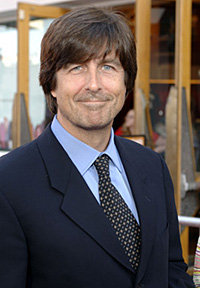

  |
|
|
||||||||||||||||||||||
|
FMS FEATURE... December 10, 2009 LA Phil Offers Concert Works by Film Composers Commissioned suite by Thomas Newman spotlighted by Jon Burlingame  On Thursday and Friday, music of Jerry Goldsmith, Franz Waxman and Thomas Newman was performed, while on Saturday and Sunday it was the music of Leonard Rosenman. In a leap forward for the acceptance of film composers in the concert hall, no loud complaints were heard and reviews were generally upbeat. Leonard Slatkin, who designed the Thursday-Friday program and had hoped to conduct those concerts, was unable to participate because he is recuperating from a recent heart attack. Replacing him were conductors John Adams, the well-known contemporary composer who was also "creative chair" for the Philharmonic and primary curator of the "West Coast, Left Coast" festival; and Jayce Ogren, recently assistant conductor of the Cleveland Orchestra. Thursday's concert saw the premiere of Newman's It Got Dark, commissioned by the Philharmonic and featuring the Kronos Quartet. The 26-minute piece was, Newman wrote in a program note, "a result of many years of collecting ephemera – photographs, postcards, recorded interviews – from the areas surrounding my home on the west side of Los Angeles... It is music of loss and memory, much distorted by my interpretations of hope and hopelessness, sorrow and joy." Prior to the concert, Newman responded to questions from pre-concert lecture moderator Frank J. Oteri. He talked about "the politics of collaboration" in responding to orchestral commissions. "A lot of it is where we are, who we're with and where we're getting information from," he said. "It's still people gathering and sharing ideas." Regarding his primary occupation, Newman said, "Music has to be involving. I just like to underline subtext in my film work and make you involved in the story." He said that, for film, he preferred creating music that was "rich in its color but static in its harmony," finding that "more harmonic movement" can be distracting and "you never want to upstage an actor," a line that drew laughter from the crowd. He talked about "a kind of mundane trial-and-error" as his compositional process – "does it work, or doesn't it, and if not, why?" Asked what he wanted listeners to take away from hearing It Got Dark, Newman responded, "I guess some kind of sustained feeling. What I feel, what I write, is interpreted by anyone's ears in individual ways." Added Kronos Quartet violinist David Harrington: "Tom's piece could take a person on a total adventure. That's what music does, and we don't have any control over it." The piece itself was in eight movements, each cryptically titled. "The Long Wharf" began with the sounds of birds and water and was primarily dark in mood, with powerful brass and percussion interruptions; strings and winds took over for the more contemplative "Glitter Mollusk"; fast-moving figures for the quartet, and the power of six French horns, were featured in "Skipping Flat Loop (Both Feet In)"; a Celtic-flavored melody took center stage in "Ice Moss." Shimmering, exotic sounds from the percussion section, along with a gypsy sound from the violins, highlighted "Will You Stay"; more electronic sounds, even a military cadence, appeared in "Rile Push Cart": "Flying Fish" had an urgent feel, spotlghting the percussion and flutes; and a chilly mood pervaded "Crystal Plunge," a consistently compelling soundscape for strings and electronics. Between movements one could hear the recorded voices of poet Virginia Benton and former Will Rogers butler Emil Sandmeier, talking about Rustic Canyon and Santa Monica Canyon, where Newman grew up. Critics were generally upbeat. The Los Angeles Times described the new work as "engaging... fun to listen to," while Variety labeled it as "eight disconnected, scene-setting, mostly dark-shaded landscapes and meditations... leaves the listener suspended in a vaguely pensive mood." The audience showed its appreciation with a three-minute ovation for the composer, quartet and orchestra. Goldsmith's Music for Orchestra, commissioned by Slatkin in 1970, received a stunning performance that was especially effective given the extraordinary acoustics of Disney Hall. The textures and effects in this serial work demonstrated the composer's mastery of the orchestra, from its angry opening to its profoundly sad moments and its rhythmic, almost tribal-sounding percussion lines. Ogren conducted. Waxman's fresh interpretation of Wagner's Tristan and Isolde, in a "fantasie for violin, piano and orchestra" originally conceived for Humoresque (1946), received a fine performance by the orchestra (conducted by Ogren), pianist Joanne Pearce Martin and violinist Bing Wang. During Sunday's pre-concert talk, conductor John Adams – who recorded Rosenman's East of Eden and Rebel Without a Cause suites for Nonesuch in 1995 – described the composer as "one of the most important, skilled and knowledgeable of all film composers." Composer William Kraft (whose timpani concerto was also on the program) regaled the crowd with amusing Rosenman anecdotes but wouldn't vouch for their accuracy because "Lenny told great stories." Adams took the microphone during the concert to extol Rosenman's virtues, calling him a "sophisticated composer" who helped to bring "psychological depth" to 1950s films like Rebel Without a Cause. He conducted 17 minutes of the score, including five of the six movements he had recorded earlier (omitting, apparently at the last minute, "The Hunt," which was listed in the program). Adams swayed on the podium to the main title theme, then elicited ethereal sounds and dissonance in "The Planetarium" and a warmer, gorgeous sound from the orchestra in Rosenman's memorable "Love Theme." The harsh, urban-jazz sounds of "Knife Fight" were a highlight (and, as annotator Deanne Hudgins correctly pointed out in her program notes, the West Side Story-like approach actually predated the Bernstein work by two years), along with the sorrowful string passages of "Plato's Death and Finale." The Los Angeles Times thought it "lovingly played" and lamented that Rosenman's concert music remains largely neglected, including a violin concerto that was one of the composer's last completed projects prior to his death last year. ©2009 Jon Burlingame |
Search
Past Features
|